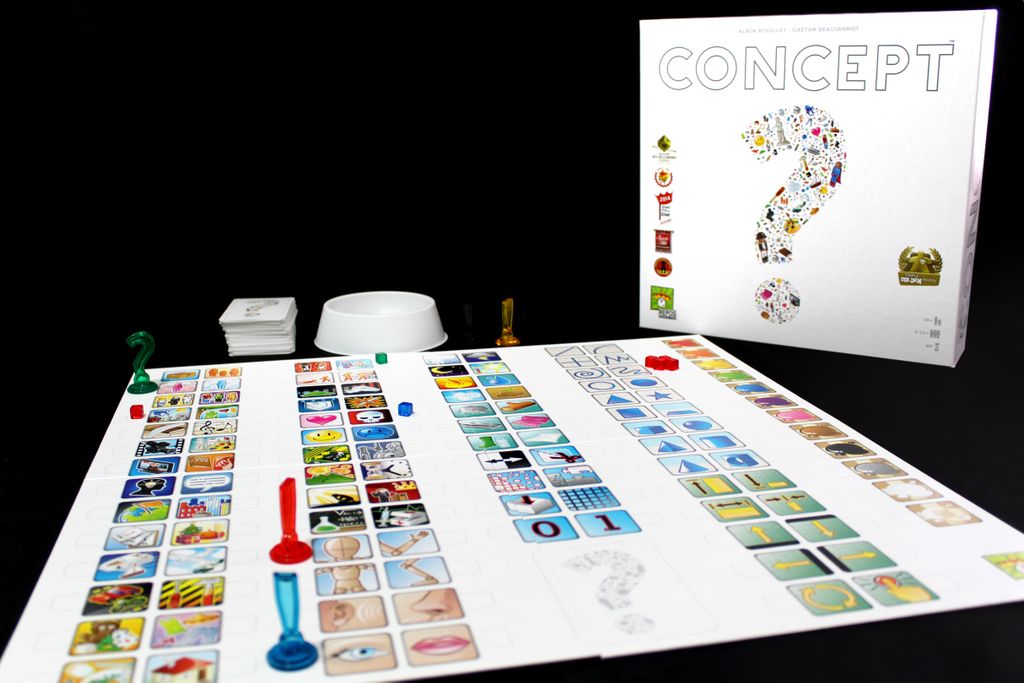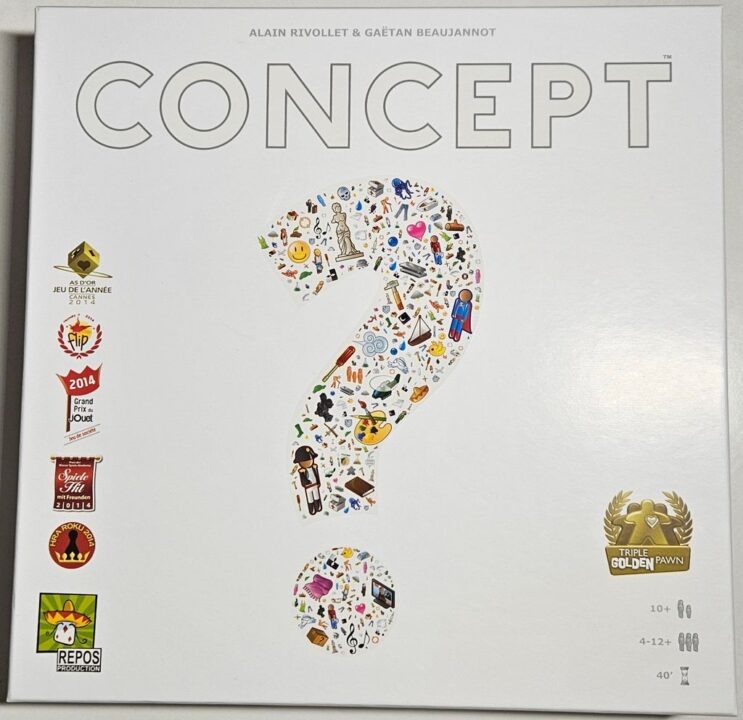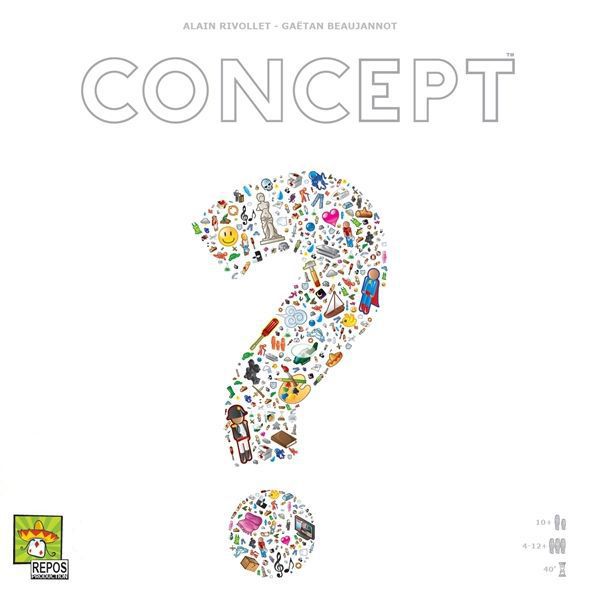Picture this: a group of friends, some snacks, and wild hand gestures that look like you’re trying to explain a UFO sighting. That’s what my nights looked like after I got my hands on Concept. If you’re hunting for a family party game that mixes clever clue giving with a pinch of chaos, then hang tight. In this review, I’ll spill the beans on the fun bits, the not-so-fun bits, and whether you should bother clearing your game shelf for it. Spoiler: I may or may not have lost friends over some questionable clue choices.
How It Plays
Setting up
Lay out the board in the middle of the table. Each player grabs a pile of guessing tokens. Put a bowl of coffee or snacks nearby because this game gets silly fast.
Gameplay
On your turn, you and your partner pick a secret word or phrase from a card. You use colored cubes and tokens to mark icons on the board, hinting at your word without saying a peep. The others try to guess your word as you point at little pictures like a desperate game of charades for people with stage fright.
Winning the game
If someone guesses right, you both get points and everyone pretends like you’re a genius. Play a few rounds and whoever has the most points gets to brag. But let’s be honest, Concept is more about laughs than winning, unless you’re my cousin Linda who keeps a spreadsheet of her victories.
Want to know more? Read our extensive strategy guide for Concept.
How Easy Are the Rules in Concept?
If you’re anything like me, you don’t want to spend an hour reading rules while your friends threaten to go home. The first time we played Concept, our usual rule-reader (let’s call him Dave) needed less than ten minutes to explain it. No one even fake-napped! That’s a win in my book.
Concept throws out the whole charades-thing and lets you use icons on a big colorful board to communicate ideas, words, or phrases. Basically, you put tokens on icons (like ‘water,’ ‘blue,’ ‘animal’) and your friends try to guess what you’re hinting at. It’s a bit like Pictionary, but you don’t need to fake being able to draw a horse. Seriously, my horses look like mutant sausages.
The rulebook uses lots of examples, which we all loved since a few of us are allergic to big blocks of text. Even our friend who thinks ‘PDF’ is short for ‘Please Don’t Forget’ got the hang of it in one round. The best part: once you see a couple turns, you don’t really need to refer back. Sure, the scoring system is a bit weird—let’s be honest, no one I know actually keeps score—but the core game is dead simple.
If your group includes folks who hate complicated rules, Concept makes life easy. No arguing about points or who cheated, just good laughs and wild guesses. So, are the rules easy? Totally. Next up: Does this game work for every group? Prepare for some surprising stories…

Does Concept Work for All Groups?
Let me tell you about the time I brought Concept to my family reunion. You know the drill—every age from smartphone-obsessed teens to that one aunt who thinks “video games” are a kind of casserole. Concept landed right in the middle of the table, and the results were… surprisingly not disastrous. That says a lot.
Concept works best with groups who like to work together and don’t mind a bit of wild thinking. It’s not a “shout at each other until grandma is yelling ‘rhino!'” sort of party game. You need a group that’s happy to puzzle things out and isn’t afraid to look a bit silly pointing at icons like they’re solving the Da Vinci Code with a migraine.
I played Concept with a gaming group once—the kind who will argue about the correct way to stack sheep in Agricola. They found it a bit too light for their tastes but still admitted it felt clever. But when I played it with a bunch of not-so-avid gamers, the game was a hit. The symbols help break down language barriers and get everyone involved, even if someone is new or doesn’t speak the same language fluently. Plus, you can play with a ton of people, which is great for those “everyone’s invited” nights.
It’s not perfect, though. Folks who want a competitive challenge might get bored, and if someone is shy, they might clam up faster than I do when asked about my high school haircut. Still, Concept mostly works with all but the grumpiest of groups.
Stick around, because next I’ll share if Concept is actually fun or just another board game collecting dust next to my unused Pilates DVD!

Is Concept Actually Fun and Worth Playing Again?
Alright, let me tell you a story. Last weekend, my friends and I sat down to play Concept. We had snacks, drinks, and someone who always forgets the rules (it’s me). What happened? Laughter, frustration, and debates about whether a hotdog is a sandwich. That’s the magic of Concept—it gets people talking, guessing, and arguing in the best way possible.
What makes Concept fun is how it makes you think sideways. You don’t just blurt out answers—you have to show them using icons and a handful of cubes. Trying to get my friend to guess ‘Las Vegas’ using only dice, money, and the color red was like watching someone try to juggle blindfolded. He guessed “angry Monopoly” at one point. Close, but not quite.
The replayability here is strong. Concept comes with a huge stack of words and phrases. After six plays, we still weren’t bored. Each group brings their own flavor. Some players will act out, some will use grand gestures, and others (like me) will make things way harder than they need to be. That’s part of the charm. No two games feel the same and there’s always a new approach to try.
If you want a party game that stretches your imagination and works with all sorts of people, Concept is a winner for repeat play. But is it the kind of game you’ll want to bring out forever, or does it fizzle out? Let’s shake our magic 8-ball and see if it gets boring quickly in the next section!
Will Concept Lose Its Charm After a Few Rounds?
First time I pulled Concept off the shelf, I got super excited. The little cubes! The funky icons! The hope that someone, anyone, would finally understand my attempt to pantomime “kangaroo” using only a green cube and the animal icon. But, as with all shiny new games, I wondered: does Concept get boring quickly? Or will my friends keep begging to play it long after the snacks are gone?
Here’s the honest truth—Concept kind of lives and dies based on your group. If you’re with creative, silly pals, this thing can go and go. The game throws random ideas at you, and you get to use the icons to guide your team without ever saying a word. It’s like charades for people who dislike standing up (me) or have no desire to act out a duck chasing a firetruck. Once, my friend tried to make us guess “internet celebrity” by pointing to the computer and then the star icon. We didn’t get it, but we laughed for a solid five minutes.
The replayability stays strong if everyone leans in. However, after a while, especially with smaller groups or if you burn through the cards, the game can feel a bit samey. Sometimes you’ll even see repeats and, unless you have a memory like mine (which is like a confused goldfish), you might start remembering answers.
All in all, I still recommend Concept. It won’t replace the classics, but it’s a good pick for a group that’s up for a laugh and doesn’t need cutthroat competition. Bring this out with new people and it’ll shine each time.
Conclusion
So that wraps up my review of Concept! If you enjoy guessing games, creative play, and occasionally watching your friends act like they’ve never seen a wheelbarrow before, this one’s for you. It’s easy to teach, plays fast, and works great with all sorts of groups—well, except maybe the grumpy uncle who just wants poker night back. It isn’t perfect, especially if your group burns out on party games or if you play with folks who freeze up under pressure. Still, I had a good time with Concept and it keeps coming off my shelf, especially at family get-togethers. If you want a light game without a luck factor, this is a safe bet. Just remember: the real prize is the inside jokes you’ll make along the way!


